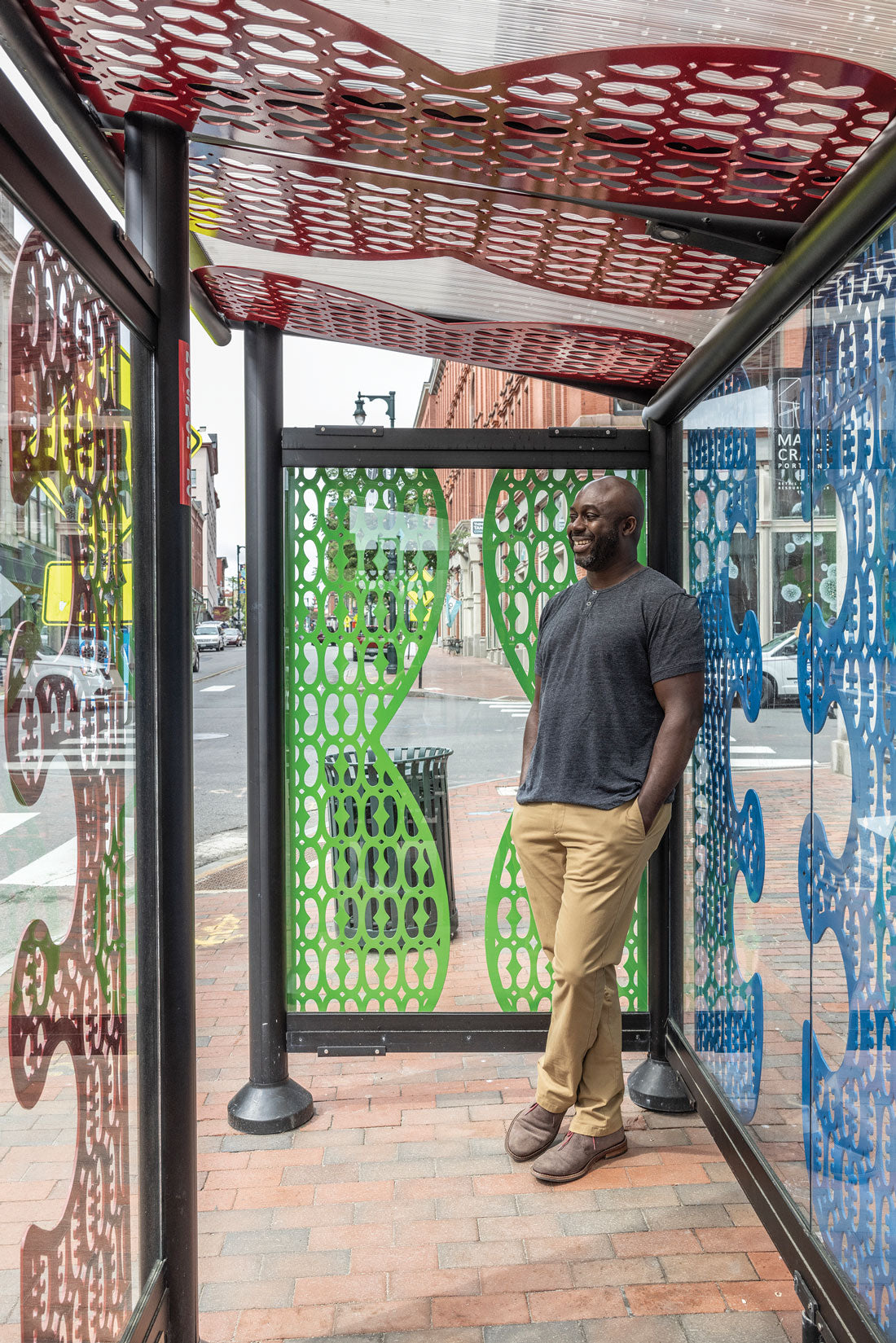Offer
Provide additional details about the offer you're running.

Traditional Ghanaian symbols for hope and friendship adorn Portland-based artist Ebenezer Akakpo’s contest-winning bus stop design.
Midmorning on a weekday, nobody was waiting outside 519 Congress Street, in Portland, where a bus shelter sits in front of the old, granite-faced Mechanics’ Hall and across the street from a CVS.
The shelter is mostly ordinary — black aluminum posts, clear glass, and a bench — except that its sides and ceiling are decorated in ornate red, green, and blue panels, an arresting splash of creativity in an otherwise utilitarian structure. As sunlight streamed through the panels, shadows recast the patterns on the brick sidewalk below.
Those patterns are repetitions of traditional Ghanaian adinkra symbols for hope and friendship. The Ghana-born, Portland-based artist and jewelry designer behind the installation, Ebenezer Akakpo, video-called on WhatsApp to check in on the bus shelter from 5,000 miles away, while visiting his native country. Earlier this year, the bus stop was voted the best bus stop in the country by readers of Streetsblog USA, a news site focused on transportation policy. In a semifinal, the Portland stop beat out a rival in Juneau, Alaska, then it edged out a Boston stop in the finals.
In Ghana, the win captured the attention of national media. “They were like, ‘Wow, it’s so cool to see our symbols being celebrated in a different time zone,’” Akakpo said.
Akakpo mounted panels signifying friendship on the front and rear of the shelter and positioned the hope panels to the sides and above. “When you meet a friend, you give a hug,” he said. “When you are in dire need, you look over your shoulder and up to the heavens for hope.” He came up with the idea while reflecting on the American political upheaval and pandemic strain of recent years. “If you don’t understand the meaning, that is fine,” he reflected. “It can look beautiful without the meaning, or it can be beautiful plus the meaning.”
The project began last year, when the nonprofit Creative Portland used a National Endowment for the Arts grant to commission Akakpo and three other local artists to decorate bus shelters. Akakpo’s initial plan was to create the designs in vinyl and apply them with an adhesive. Then, he had a last-minute stroke of inspiration — he likened the feeling to Ray Allen’s waning-seconds, game-tying three-pointer in game six of the 2013 NBA championship. “Whenever I am working on a project,” he said, “it is until the final whistle is blown. There is always room for improvement.” Drawing inspiration from his father, an architect, he ditched the vinyl for something with more physicality: powder-coated steel, cut with a fiber laser and fastened to the metal frame with screws. He thinks that decision made the difference in the best-stop competition.

Toward noon, with Akakpo watching on WhatsApp, riders started showing up. A woman from out of town thought the friendship symbols looked like butterflies. A man from Congo said the designs reminded him of a puzzle. An elderly man who had been riding this line every day for well over 50 years found the designs “odd, but interesting.” Did it make him think of anything? “The back of a deck of cards.” Another man, asking a trio of art students if they could spare any change, chimed in: “Maybe a dragon? Some kind of Chinese . . . I don’t know.” He reconsidered. “I’d like to have a beer in there. On First Friday, when the bands are playing on the street. Perfect.”
Akakpo was once a frequent rider — he went to school across the street at the Maine College of Art — although he hadn’t used this bus shelter for its primary purpose since adding the panels. “I do plan to do that,” he said. “I think it would be cool.” In the meantime, he liked knowing that, even as he was in Ghana, people on a sidewalk in Maine were engaging with his art and his culture. “One philosophy I live by: at the end of the day, we’re not gonna take anything with us,” he said. “Sometimes the things that we leave behind, if they put a smile on people’s faces, we have done our part.”
Source : Down East
And be the first to hear about new arrivals